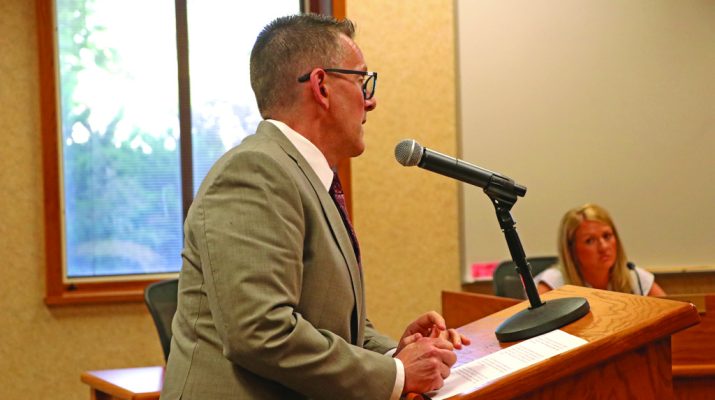Questions regarding items listed on the Consent Calendar, one of two items on the agenda for the council to take up at its June 4 meeting, resulted in one item being removed from the Consent Calendar and a broader discussion on happenings in Alliance.
In a discussion regarding the Consent Calendar, Alliance City Council Member Tacy Liptack made a motion, asking that Resolution 24-52, the purchase of a camera trailer by the Alliance Police Department, be removed from the Consent Calendar. A second was made by Council Member Brian Mischnick. After a 4-1 vote, with Vice Mayor Tearza Mashburn voting against the motion, the item was removed from the Consent Calendar.
Mashburn asked about another item on the Consent Calender, Resolution 24-53, acceptance of a vehicle donation to the Alliance Police Department, questioning the intent for the vehicle.
APD Chief David Leavitt explained that he received a letter in the mail in which a family expressed their wish to donate a vehicle to the Alliance Police Department.
“I took it downtown, and after some discussion, it was determined since it was donated to the police department officially, the police department would be the one to receive the donation if the council agreed to accept it,” said Leavitt. “However, that vehicle can be used by any department in the city. We can make that another travel vehicle. We can do whatever we want with it. It’s not limited to only being used by the police department.”
Leavitt said that he believes they could put the vehicle to good use since it was donated. City Clerk Shelbi Pitt said that they are still waiting to receive the keys to the vehicle before they can fully assess its condition.
Liptack asked whether the vehicle could qualify as an undercover vehicle. Leavitt responded that as long as it is deemed to be roadworthy and that there is no other use for it, they could definitely use it for that purpose.

“When somebody makes a donation, it would be good to find a use for it,” said Mayor John McGhehey.
Mashburn then asked questions about Resolution 24-54, a request from the Alliance Housing Authority, asking about the funds that are being set aside and whether they are for restoration of a playground or for purchasing new equipment. Patricia Klemke, Executive Director of the Alliance Housing Authority, said that it is for new equipment. She explained that they planned to have one installed at the end of their apartment area on Big Horn. She said that through meeting with City Manager Seth Sorensen, they discussed a lot that was designated in the Consolidated Plan at the AHA Rosewood property.
“My thought is, I don’t really care where it’s at,” said Klemke. “I just think that the kids up in that area need somewhere to play and gather without having to cross 25th Street.”

Mashburn asked if Klemke had cost estimates available, and Klemke responded that due to the timing, she did not have those figures available. She indicated that there was only $5,000 available in the fund so far. Klemke said that in discussions with Sorensen that it may be possible to allocate those funds toward a planned city project in the area.
Next, Liptack asked about Resolution 24-50, awarding a bid to repair hail damage from 2021 to the Public Works Facility.
“I guess I’m just curious as a new Council Person and also a taxpayer, was the building insured and, if so, what is being allowed as revenue from the insurance company to put towards this expense,” said Liptack.
Pitt explained that at the time, the insurance claims were submitted, but the work had not been completed.
“Insurance paid out a lump sum for the whole project of all the claims, and then they just owe us our depreciation,” said Pitt. “So, right now, I can’t give you a total number of what the City will end up paying for it, because all the projects have not been completed with the depreciation paid in. Plus, we have FEMA money coming in as well to help cover the exceeded costs of that.”
Liptack asked if those figures would be available to see at some point eventually. Pitt responded that once the projects are completed, they will be able to calculate those figures. With that, the council voted to approve the Consent Calendar before moving on to discuss the purchase of the camera trailer by the Alliance Police Department.

Liptack asked Leavitt about the project and about the status crime in Alliance.
“I guess, also, as a former employee of the police department, I’m just curious, what is the current violent crime in Alliance in 2024,” said Liptack. “And what was the violent crime rate in 2023?”
Leavitt said that he did not have those numbers with him at the council meeting, but noted that he could provide them to her.
“I guess where I’m a little confused about this is it talks about a grant that was received, and I’m curious if this was a capital outlay project, did you inherit this project from the previous Chief of Police, or is this something in the last 60, 90 days that you put together?” Liptack asked.
Leavitt said that he inherited the grant balance from the previous Chief.
“Several projects that he had started were not followed through on, and several things that were put into place, we decided not to continue with because we had some redundancy and there was some cost savings from kind of consolidating these things that we weren’t using,” said Leavitt. “I’m still finding out that we’re paying for things that we don’t use and that we never have used. So, we’re trying to clean all that up to be good stewards of the taxpayers’ money.”
Liptack asked if the grant would be lost if the money is not spent, and Leavitt responded that they have to spend it by the end of the year. She asked about a service warranty on the camera trailer, and Leavitt noted that he opted for a five-year service warranty, making that decision after researching other options for camera trailers.
“Once we have this camera trailer, it won’t cost us a dime for the next five years,” Leavitt said. “Everything is covered.”
Liptack asked whether the camera trailer could be used to detect speeders, and Leavitt responded that it was not designed for those capabilities.
“The best use of this camera is to use it in a surveillance mode, and also in a deterrence mode,” said Leavitt. “So, you set up the camera trailer, it’ll have red and blue flashing lights on it, it’s an excellent deterrent. We used these extensively in my prior department. They’re used all over the country with great success. The beauty of this camera is it’s not just on a pole in one place. We can put it where we need to based on crime.”
Leavitt said that he did not pursue the purchase of the camera trailer due to a violent crime problem in Alliance, but rather because of its utility within the parameters of the grant.
“In full transparency, there are things I would have much rather spent $64,000 on: new body cameras, vehicles, radio upgrades, new vests,” said Leavitt. “We had to buy some new vests. We had officers with vests that were expired. Unfortunately, the things that I really wanted to spend that money on, as you well know, the grant was very specific about what you can spend that money on, the things I really wanted, I couldn’t buy. Discussing it around the department, this is what we came up with. The citizens get an input on this piece of equipment because if a business, or church, or neighborhood is having specific problems in a specific place, we can place the camera trailer there and conduct surveillance.”
Leavitt said there were no privacy concerns because the trailer would be placed in a public location. After some more discussion, the council voted unanimously to approve the purchase of the camera trailer.
(Photos by Kathryn Friedrichsen)

